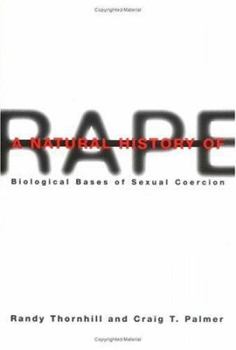A Natural History of Rape: Biological Bases of Sexual Coercion
Select Format
Select Condition 
Book Overview
A biologist and an anthropologist use evolutionary biology to explain the causes and inform the prevention of rape.In this controversial book, Randy Thornhill and Craig Palmer use evolutionary biology... This description may be from another edition of this product.
Format:Hardcover
Language:English
ISBN:0262201259
ISBN13:9780262201254
Release Date:January 2000
Publisher:MIT Press (MA)
Length:272 Pages
Weight:1.25 lbs.
Dimensions:0.9" x 6.3" x 9.3"
Related Subjects
Administration & Policy Behavioral Sciences Biological Sciences Biology Biology & Life Sciences Clinical Criminology Ethics Evolution Gender Studies Health, Fitness & Dieting Health, Fitness & Dieting Medical Ethics Medicine Mental Health Nonfiction Physiological Aspects Politics & Social Sciences Psychology Psychology & Counseling Science Science & Math Science & Scientists Science & Technology Social Science Social Sciences Transgender Violence in SocietyCustomer Reviews
4 ratings
Definitely Worth Reading
Published by Thriftbooks.com User , 24 years ago
Be very skeptical of what you may already have heard about this book. Read it yourself, and you will find that the authors make a far more compelling case for biology's effects on patterns of sexual aggression than the book's often alarmist critics would have you believe. The authors' argument, put simply, is that if we want to be more effective at preventing rape, then the more we understand about its multiple causes the better. The authors convincingly argue that causation of human behavior is a scientific, empirical issue that biology can help to illuminate. And the book provides a highly readable exploration of biological approaches to understanding sexual coercion in the many species (including humans) in which it appears. Some critics of the book have attempted to make much of the theoretical possibility that the book may afford rapists a defense at trial. I am a law professor specializing in potential legal implications of human behavioral biology. And as I explain in a recent law review article (Sex, Culture, and the Biology of Rape: Toward Explanation and Prevention, California Law Review 87:827 -- July 1999) I do not think the biological theories presented in this book can or will support successful genetic defenses to rapists. Nonetheless, there are still non-trivial, non-trial, legal implications that may help the system handle and deter rape more effectively. This makes reading the book an essential step in understanding and reducing female victimization.Disclosures: I Co-Directed a conference on Law, Biology, and Sexual Aggression, at which both Thornhill and Palmer were invited speakers, and I helped to review the Thornhill/Palmer manuscript in a pre-publication phase.
Excellent reading
Published by Thriftbooks.com User , 24 years ago
As a woman, a feminist, and a sociologist by training, I still find nothing offensive in this book. Thornhill and Palmer have tackled one of the most sensitive and inflammatory topics that exist and it is only natural that they will receive a lot of knee-jerk reactions to it. However, this book is well-written, well-researched and thought-provoking. Whether you ultimately believe their theory or not, T and P will make you seriously consider some of your assumptions about rape. I'm not sure if some of the other reviewers have actually read this book, because nowhere in it do the authors assert that women are to blame for their rapes or that they provoke them through sexy clothing. They do suggest that sexy clothing might be one of many factors that lead men to rape and that women may CHOOSE to use this knowledge when deciding how to dress for certain situations. Why this particular issue is so offensive boggles me. I have had many people suggest that I take a women's self-defense class to help me avoid and/or survive an attack. But that suggestion in no way implies that if I *don't* take a self-defense class I am somehow responsible for causing my own rape. Similarly, women can arm themselves with the knowledge that how they dress may have an effect on how some men behave towards them, without being responsible for that behavior in any way.I'd advise anyone interested in this topic to read the book carefully and thoroughly. Does the book prove that rape is an evolutionary adaptation? Of course not, but it certainly offers some compelling evidence and an interesting alternative to current theories on rape.
Choices?
Published by Thriftbooks.com User , 24 years ago
Unfortunately misinterpreted by the press, this book can actually increase our knowledge about how to stop the rape!It represents a brilliant and troubling attempt to look into who we really are: writers goad the reader to introspection and to fresh perspectives about one's choices and place in society; it could well change the way people think, and maybe even how they behave.
Objective thinking
Published by Thriftbooks.com User , 24 years ago
There are two issues here: (1) is the book well-researched? (2) does this information have policy implications; that is, can it help us reduce the incidence of rape? Yes, the objective reader will see immediately that it is a well researched book. The theory is solid and there is ample supporting evidence and not just evidence drawn from insect studies. Yes, there are policy implications here -- the authors suggest things we can do to reduce the chances a female will be raped. Despite the popularity of the power/violence theories, rape still occurs and with some frequency. The test of any theory should be found in whether it fits the evidence, not whether it is politically correct.





